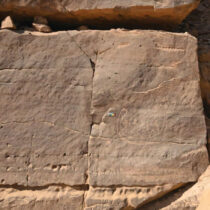Emory University and the Ministry of Culture of the Hellenic Republic signed a long-term agreement of cultural cooperation on Jan. 22, which includes more educational opportunities for students and the return to the Greek ministry of three objects in the collection of the Michael C. Carlos Museum at Emory.
Lina Mendoni, the Minister of Culture for the Hellenic Republic, traveled to Atlanta to tour the Carlos Museum and meet with Emory leaders. Mendoni and Ravi V. Bellamkonda, provost and executive vice president for academic affairs at Emory, signed the agreement, which pledges a spirit of goodwill to work together to further advance knowledge of Greek culture, while also protecting Greek cultural heritage. The museum and Ministry remain in ongoing dialogue about collaboration on future projects.
Under the agreement, the Carlos Museum will voluntarily transfer a Minoan larnax, a Classical sculpture of a seated man and a sculpture of a muse. The decision to return the objects follows discussions between Emory and the Ministry over the past two years and supports the museum’s ongoing study of the provenance of objects in its collections and its commitment to resolve official claims on its collections.
Information shared by the Ministry indicated that the objects were included as evidence in court cases related to antiquities trafficking in Greece. The new provenance histories challenge what was known about the pieces at the time the museum acquired them.
“The Ministry of Culture of the Hellenic Republic welcomes the decision of the Carlos Museum to return three ancient artifacts from its collections to the Greek people, as it has been well documented that they had been illegally exported from Greece,” Mendoni said.
“Today’s repatriation will become the starting point for close cultural cooperation in the coming years between the Ministry of Culture of the Hellenic Republic and Emory University,” Mendoni continued. “We hope that other museums abroad will follow the example of the Carlos Museum, which has sought to solve the problem through dialogue and a spirit of cooperation.”
The agreement between the Ministry and Emory will create more opportunities for Emory students, faculty and staff to participate in excavations in Greece. Emory students and staff have dug at sites such as Samothrace and the Agora in Athens.
“Emory University is proud of our long-standing commitment to being one of the foremost advocates for Greek culture in the southeast United States,” Bellamkonda said. “On behalf of the university, I thank the minister for her work in developing this agreement. It is historic. It is important. And it signals a sincere intent to deepen relations and collaborate on our shared missions of studying, sharing and protecting Greek culture, and doing so to the highest ethical and academic standards.”
The agreement provides the opportunity for the Carlos Museum to partner with museums in Greece on the loan of objects and the creation of new exhibitions for Emory and the larger community of Atlanta.
“Today’s event is just the beginning, and the Carlos Museums looks forward to many years of expanded cultural cooperation between the Ministry and Emory,” said Henry S. Kim, associate vice provost and director of the Carlos Museum. “We are honored to be part of efforts to protect and preserve cultural heritage in Greece and around the world.”





